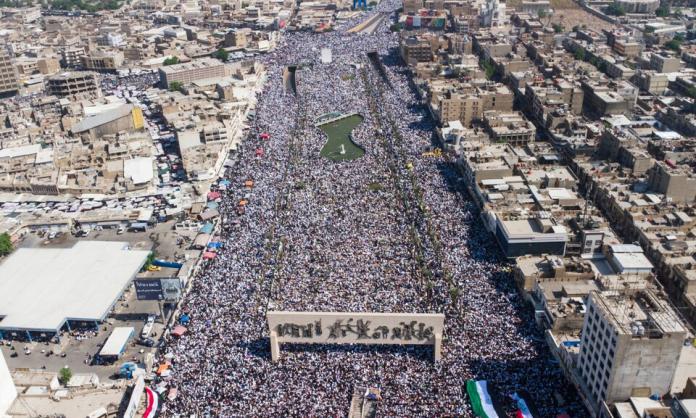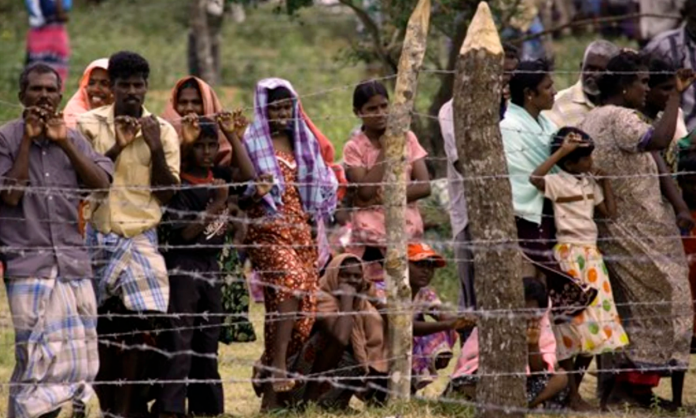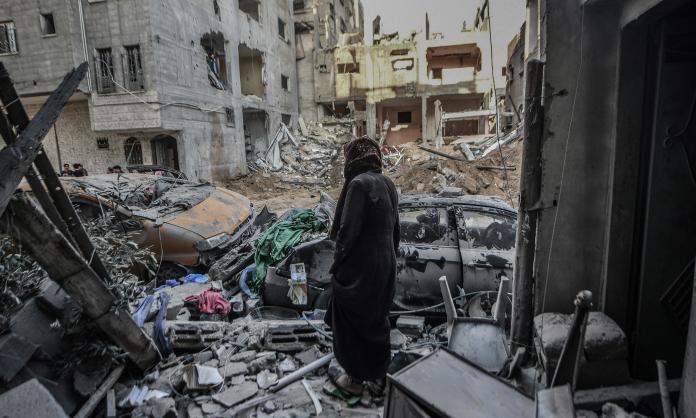Millions of people across the Arab world have joined demonstrations against Israel’s war on Gaza. Mass demonstrations have taken place in Iran, Iraq, Tunisia, Yemen and Qatar. In Damascus, Syria, Palestinians from the Yarmouk camp rallied in support of their compatriots in Gaza.
Outside both the French and US Embassies in Tunis (Tunisia’s capital) thousands demonstrated as part of calls for national mobilisations by most of the country’s political parties and trade unions. (Many cite these as the largest demonstration in the country since the 2011 uprising that toppled dictator Ben Ali.) Protesters held signs pointing to US lies that justified the invasions of Iraq and Afghanistan, chanting: “No one of is free until Palestine is free!”
In Yemen an estimated 1.5 million people took part in demonstrations against the war. In many countries, such as Morocco and Bahrain, protesters have demanded a reversal of their government’s “normalisation” with Israel—the act of recognising and establishing diplomatic ties with the Zionist state—and collaboration with Western powers.
Hundreds of demonstrators clashed with Lebanese armed forces outside the US Embassy in Beirut, the capital, after Hezbollah called for a “day of unprecedented rage”.
In Istanbul, Turkey, 80,000 people massed outside the Israeli consulate, including some who attempted to storm the building armed with stones, sticks, torches and fireworks, forcing Israel to withdraw its diplomats from the country.
In Jordan, mass demonstrations have taken place in the capital, Amman, as well as the cities of Irbid and Zarqa. Protesters demanded the expulsion of the Israeli ambassador, the end of the 1994 peace treaty with Israel, and the nullification of an agreement to buy natural gas from Israel, which Jordan signed in 2016. Protesters have also demanded the opening of Jordan’s border with the Israeli-occupied West Bank (there are an estimated 3 million Palestinian refugees in Jordan) and many descended on the border and even attempted to scale its walls.
After the Israeli bombing of Al-Ahli hospital in Gaza, Jordanian officials were forced to cancel a summit that was to host US president Joe Biden, Egyptian dictator Abdel Fattah al-Sisi and Palestinian Authority leader Mahmoud Abbas. Meanwhile, hundreds of young people tried storming the Israeli Embassy building in the capital, shouting: “No Zionist embassy on Arab land!”
Sisi, who seized power in a 2013 coup, and his regime, which plays an important role maintaining the siege on Gaza, have also become targets of demonstrations, with protesters demanding the closure of the Israeli embassy and the expulsion of the Israeli ambassador. They also called for the peace treaties between Egypt and Israel to be scrapped.
Protests have taken place at several university campuses, in Alexandria’s Port Said, as well as at the Rafah Crossing linking Gaza and Egypt. Protests have also erupted at Cairo’s Al-Azhar mosque, as worshippers took part in unplanned demonstrations after Friday prayers.
For the first time since the Egyptian revolution of 2011-13, protesters broke through police lines into Tahrir Square, the historic centre of the 2011 uprising that toppled dictator Hosni Mubarak. Protesters chanted, “The people want the fall of Israel!”, modifying a common chant from the Arab Spring: “The people want the fall of the regime”.
The mobilisations are significant not only for the solidarity they express with Palestinians facing occupation, war and genocide—they are a potential nightmare for Israel, the West and the complicit Arab regimes.
Because there is no substantial Palestinian working class or urban population that can strike decisive blows against Israel, any serious challenge to Israeli apartheid will require standing up to, and ultimately toppling, the Arab ruling classes that help normalise the Zionist state.
Throughout the Middle East there are areas in which concentrations of workers are endowed with immense potential power: oil and transport workers, including dock workers, who can disrupt the flow of profits to the ruling classes and who can restrict the movement of goods in and out of Israel; and white-collar workers in the government sector who have the power to cripple the state apparatuses.








